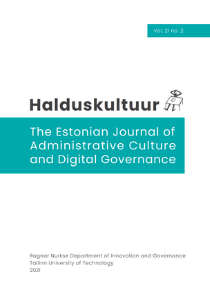The Japanese Civil Service: Paradox of a Reform Driven by but Ignoring Emotion
The Japanese Civil Service: Paradox of a Reform Driven by but Ignoring Emotion
Author(s): Hiroko Shimada LogieSubject(s): Civil Society, Governance, Government/Political systems, Transformation Period (1990 - 2010), Present Times (2010 - today)
Published by: Ragnar Nurkse School of Innovation and Governance, Tallinn University of Technology
Keywords: Japan; Civil Service; Civil Service Reform; Japanese Diet; personnel control; Westminster Model; Wittgenstein’s language game; impartiality; bureaucracy;
Summary/Abstract: This essay, based on a public lecture, deals with the last Civil Service (CS) Reform in Japan, which had been attempted since the 1990s and was completed in 2014. Bureaucrats enjoyed a “summer” where they actively were engaged in policy-making. But a series of policy failures and scandals revealed in the 1990s were attributed to their excessive autonomy, and centralized personnel control by the prime minister was introduced. However, discourse analysis of the Diet (Parliament) during the period of Reform indicates that there was neither a shared understanding of the meaning of CS impartiality, nor of the values to be borne by the CS. The driving force of the Reform was mainly people’s fury. It therefore resulted in relegating bureaucrats to being “lackeys” of the prime minister, ignoring their self-respect. This has given rise to various undesirable consequences. Will the CS see another “spring” in Japan?
Journal: Halduskultuur
- Issue Year: XXI/2021
- Issue No: 2
- Page Range: 64-79
- Page Count: 16
- Language: English

